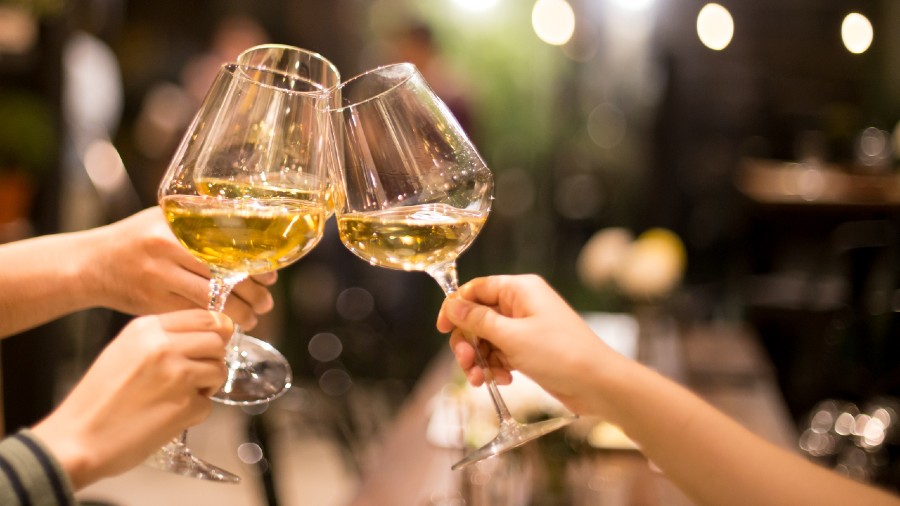After a long year and a lot of anticipation, getting the Covid-19 vaccine can be cause for celebration, which for some might mean pouring a drink and toasting to their new immunity. But can alcohol interfere with your immune response?
The short answer is that it depends on how much you drink.
There is no evidence that having a drink or two can render any of the current vaccines less effective. Some studies have even found that over the longer term, small or moderate amounts might actually benefit the immune system by reducing inflammation.
Heavy alcohol consumption, on the other hand, particularly over the long term, can suppress the immune system and potentially interfere with your vaccine response. Since it can take weeks after a shot for the body to generate protective levels of antibodies against the novel coronavirus, anything that interferes with the immune response would be cause for concern.
“If you are a moderate drinker, there’s no risk of having a drink around the time of your vaccine,” said Ilhem Messaoudi, director, Center for Virus Research at the University of California, Irvine, US, who has conducted research on the effects of alcohol on the immune response. “But be very cognisant of what moderate really means. It’s dangerous to drink large amounts because the effects on all biological systems are pretty severe and they occur pretty quickly after you get out of that moderate zone.”
Moderate drinking is generally defined as no more than two drinks a day for men and a maximum of one drink a day for women. Heavy drinking is defined as four or more drinks on any day for men and three or more for women. One “standard” drink is considered 5 ounces (almost 150 millilitre) of wine, 1.5 ounces (45ml) of distilled spirits or 12 ounces (over 350ml) of beer.
Some of the first concerns about alcohol and Covid vaccination began circulating after a Russian health official warned in December that people should avoid alcohol for two weeks before getting vaccinated and abstain for another 42 days afterward. According to a Reuters report, the official claimed that alcohol could hamper the body’s ability to develop immunity against the novel coronavirus.
In the US, some experts say they have heard similar concerns. “We’ve been getting a lot of questions from our patients,” said Dr Angela Hewlett, an associate professor of infectious diseases who directs the Covid infectious diseases team at the University of Nebraska Medical Center. “Understandably, people who are receiving these vaccines want to make sure they’re doing all the right things to maximise their immune response.”
Clinical trials of the vaccines currently approved by the FDA did not specifically look at whether alcohol had any impact on the effectiveness, Hewlett said. It’s possible there will be more information in the future. But for now, most of what is known comes from previous research, including studies that examined how alcohol affects the immune system in humans and whether it hinders the immune response in animals that received other vaccines.
One thing is clear — heavy alcohol consumption impairs the immune response and increases susceptibility to bacterial and viral infections. It prevents immune cells from travelling to sites of infection and carrying out duties, like destroying viruses, bacteria and infected cells; makes it easier for pathogens to invade your cells, and causes a host of other problems.
In contrast, moderate drinking does not seem to have this effect. In one study, scientists exposed 391 people to five different respiratory viruses and found that moderate drinkers were less likely to develop colds, but not if they were smokers.
In another study, Messaoudi and colleagues provided rhesus monkeys access to alcoholic beverages and then looked at how they responded to a vaccine against poxvirus. Much like humans, some rhesus monkeys enjoy alcohol and will drink a lot, while others will limit themselves to small amounts. The researchers found that the animals that were chronically heavy drinkers had a weak response to the vaccine — “almost a non-existent immune response”. The animals that consumed moderate amounts, however, generated the strongest response, even compared with the teetotalers. Studies in rats have found a similar pattern. Those consuming large amounts have a weak immune response compared with the ones given moderate amounts or none at all. Studies have also found that when people drink moderately, it seems to lower inflammatory markers in their blood.
Another reason to moderate your alcohol intake is that heavy drinking can potentially intensify any side effects you might have from the Covid vaccine, including fever, malaise or body aches, and make you feel worse, said Hewlett, who chose not to drink after getting the vaccine. But she said that people should feel free to imbibe so long as they drink within reason.
“A glass of champagne probably won’t inhibit any immune response,” she said. “I think having a celebratory beverage in moderation is fine.”
NYTNS











